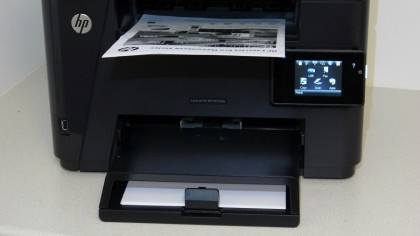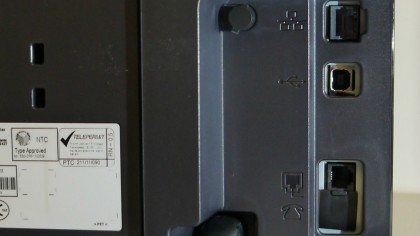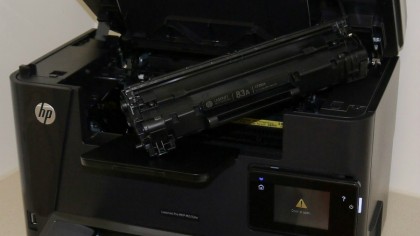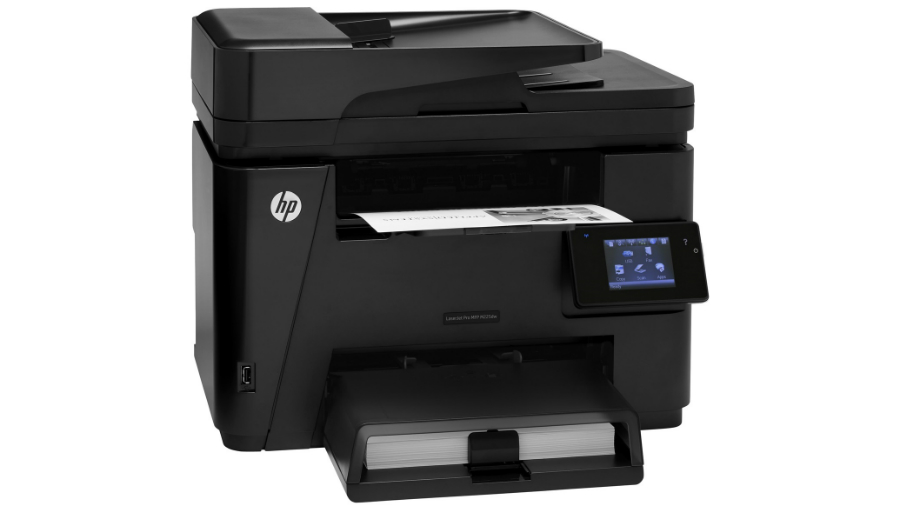TechRadar Verdict
Small businesses looking for a print, scan and copy workhorse on a budget could do a lot worse than the LaserJet Pro MFP M225dw. It's from HP, it's got a laser engine and a duplexer, plus it looks smart and ticks most of the connectivity boxes. It does have a few rough edges but it's cheap to buy, cheap to run and it gets the job done.
Pros
- +
Fast laser engine plus quality scanner with ADF
- +
Automatic duplexer
- +
Good wired and wireless connectivity options
Cons
- -
Non-responsive touchscreen with hard to follow interface
- -
Single-sided scanning
- -
Single paper tray
Why you can trust TechRadar
Still very much the leader when it comes to printing, HP has something for everyone, from the home user to large corporates. The LaserJet Pro MFP M225dw measures 44 x 29 x 37cm (17 x 11 x 15-inches). It is aimed at small business buyers looking for a budget print/scan/copy solution. Despite a modest price tag of just £201 ex VAT ($305, AU$375), it turns out to be a very capable device, albeit with a couple of minor shortcomings that are inevitable when building to a price.
HP by name, HP quality by nature
The usual HP build quality applies here with a solid look and feel, despite extensive use of clip-together plastic mouldings. As such, the LaserJet Pro MFP M225dw certainly looks the part, housed in a smart all-black casing that follows normal MFP conventions, which, in this case, means a 600dpi monochrome laser engine in the base of the unit plus a 1200dpi flatbed scanner mounted above.
An automatic 35-sheet document feeder is also built-in, sitting on the top of the stack to help automate both scanning and copying. However, it's worth noting that the scanner only has one scan head which makes double-sided scanning/copying a far from straightforward process that requires extra manual intervention.

A single 250-sheet tray keeps the engine fed with paper and there's a useful bypass slot above to cope with headed paper and other non-standard media without having to mess around with the main paper tray. A another tray would be nice but that's a rare option in this price bracket and, for a small business, the 250 sheet capacity (half a ream) should be enough. Moreover, unlike the HP OfficeJet Pro 6830 that targets the same sector, the M225dw has a separate catch tray near the top for finished documents which doesn't get in the way of using either the paper tray or bypass slot.
The power supply is built-in so no AC adapter is needed and, as well as a USB connector for direct PC attachment, there's a Gigabit Ethernet port for LAN sharing plus 802.11n WiFi (hence the "dw" at the end of the model number). Wireless makes it a very easy device to install, we had it unboxed and working in less than five minutes. Plus it supports direct wireless printing from notebooks, tablets and smartphones without the need for a WiFi network.
A colour touchscreen provides the interface required for walk-up operation and there's a front-mounted USB port for memory stick and external disk attachment. The other connector ports are found at the rear, including a socket for the phone lead should you wish to take advantage of the built-in fax capabilities. Not that many businesses do these days, with fax rapidly becoming something of an anachronism on this type of product.

Speed and ability
Duty cycle for the MFP is 8,000 pages per month which is more than adequate for a device of this type. The laser engine is similarly well matched at 25ppm, or 15 sides per minute if you choose to take advantage of the built in duplexer and print double-sided. As with all printer/copiers, however, actual throughput is likely to be a lot slower than this, although with a 600MHz processor and 256MB of memory it's far from slow.
We tested using a wireless network connection and there was a noticeable lag when sending a document to print, the first page taking around 10 seconds to appear. Later pages, however, came out much more quickly. A typical 9-page PDF, for example, printed in 30 seconds overall, effectively giving 18ppm with other applications managing to get even closer to the engine speed.
The scanner, meanwhile, is rated at just 14ppm for mono (6ppm for colour) with a single copy of a monochrome original taking around 13 seconds to complete, equating to just under 5ppm for single-sided copying. Colour originals were slower to copy but not hugely so and if you're going to do a lot of colour copying this device isn't necessarily the right tool for the job anyway.
Print quality is, again, good enough for a business printer/copier and you have to pay quite a lot more to get better. One small niggle is the inability to print right to the edge of the paper. Not an issue when printing but noticeable when copying, especially for documents that have had notes scribbled on them.

Running costs should be low with a single toner/imaging cartridge the only consumable required. This is very easy to change and, although, the cartridge delivered with the printer is rated for just 1,500 pages, a "high yield" alternative is available. Unfortunately it's not that high yield, being good for just 2,200 pages. The official price is £65 inc taxes ($99, AU$121), but we found it for a lot less and "compatible" cartridges sell for around a third of that price.
